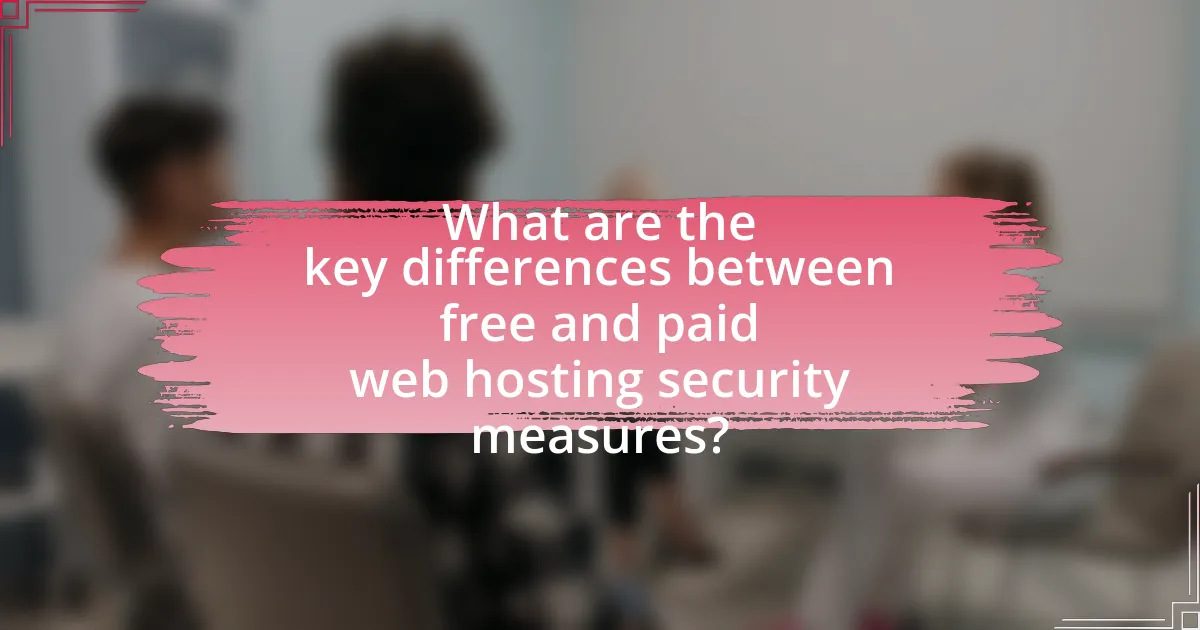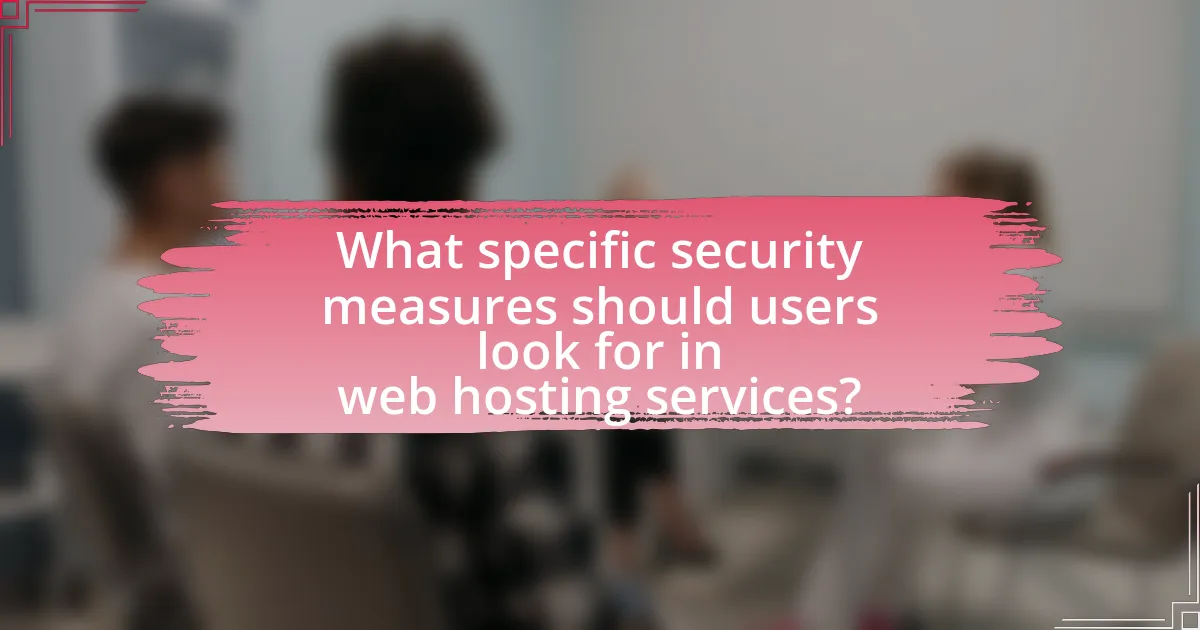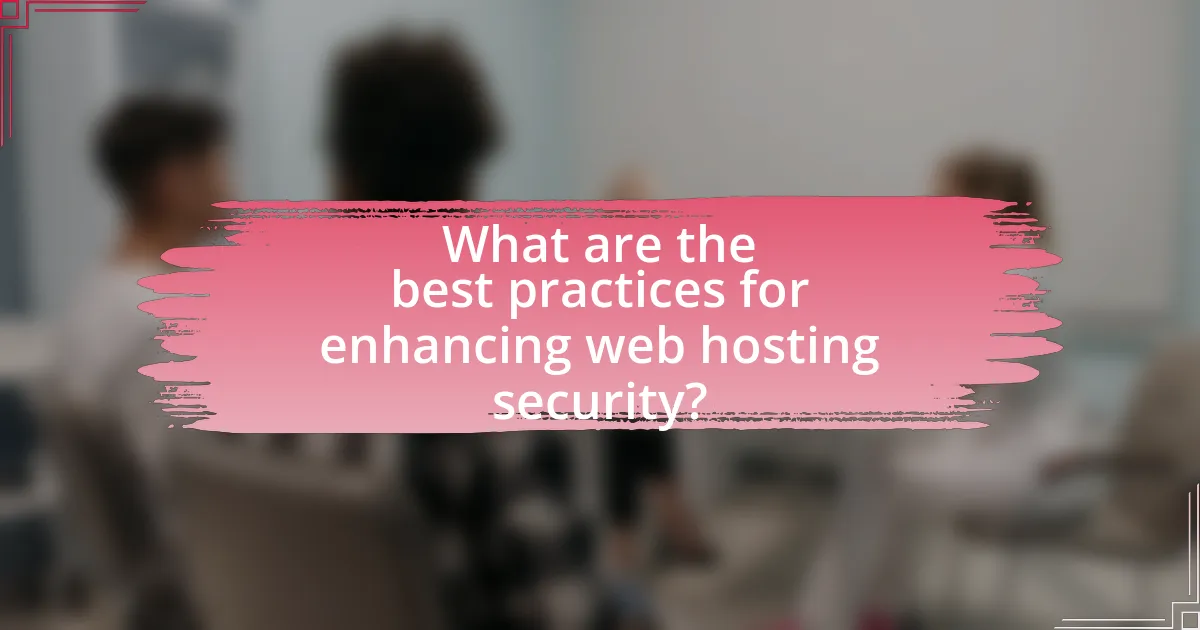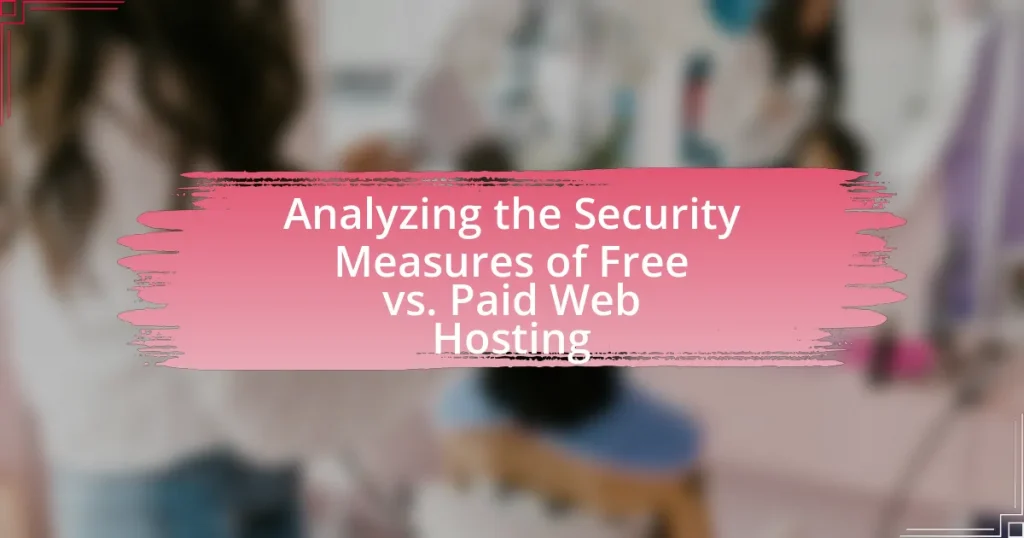The article analyzes the security measures associated with free versus paid web hosting services. It highlights that free web hosting typically offers minimal security features, making websites more vulnerable to cyberattacks, while paid hosting provides comprehensive protections such as SSL certificates, DDoS mitigation, and regular backups. Key vulnerabilities of free hosting include inadequate security protocols and shared resources, which increase exposure to risks. In contrast, paid services implement advanced security measures and offer dedicated customer support, significantly reducing the likelihood of data breaches and enhancing overall data protection. The article emphasizes the importance of considering security when selecting a web hosting provider, particularly for businesses handling sensitive information.

What are the key differences between free and paid web hosting security measures?
Free web hosting typically offers minimal security measures, while paid web hosting provides comprehensive security features. Free hosting often lacks essential protections such as SSL certificates, regular backups, and advanced firewalls, making websites more vulnerable to attacks. In contrast, paid hosting services usually include robust security protocols, including DDoS protection, malware scanning, and dedicated customer support for security issues. According to a study by HostingAdvice, 70% of free hosting services do not provide adequate security, whereas 90% of paid services implement multiple layers of security to protect user data.
How do free web hosting services typically handle security?
Free web hosting services typically handle security with limited measures, often relying on basic protocols and shared resources. These services may implement standard security features such as firewalls and basic encryption, but they frequently lack advanced protections like DDoS mitigation, regular security audits, and dedicated support. For instance, a study by HostingAdvice found that many free hosting providers do not offer SSL certificates or regular backups, which are critical for safeguarding data. Consequently, users of free web hosting may face higher risks of data breaches and cyberattacks compared to those using paid services that invest in comprehensive security infrastructure.
What common vulnerabilities are associated with free web hosting?
Common vulnerabilities associated with free web hosting include limited security features, lack of regular updates, and shared resources that increase exposure to attacks. Free web hosting services often do not provide robust security measures such as firewalls, SSL certificates, or malware scanning, making websites more susceptible to breaches. Additionally, these platforms may not prioritize timely software updates, leaving known vulnerabilities unpatched. The shared nature of free hosting means that if one site on a server is compromised, others can be affected, amplifying the risk of cross-site scripting and other attacks.
How does the lack of resources impact security in free web hosting?
The lack of resources in free web hosting significantly compromises security by limiting essential protective measures. Free web hosting services often provide minimal server resources, which can lead to inadequate security protocols, such as outdated software and insufficient monitoring. For instance, a study by the Ponemon Institute found that organizations with limited IT budgets experience a higher frequency of data breaches, highlighting the correlation between resource allocation and security effectiveness. Consequently, the absence of robust resources in free hosting environments increases vulnerability to cyberattacks, making them less secure compared to paid hosting options that typically invest more in security infrastructure.
What security features are generally offered by paid web hosting services?
Paid web hosting services typically offer advanced security features such as SSL certificates, DDoS protection, firewalls, and regular backups. These features are designed to protect websites from various threats, ensuring data integrity and availability. For instance, SSL certificates encrypt data transmitted between the user and the server, enhancing security and boosting SEO rankings. DDoS protection mitigates attacks that aim to overwhelm servers, while firewalls monitor and control incoming and outgoing network traffic based on predetermined security rules. Regular backups ensure that data can be restored in case of loss or corruption, providing an additional layer of security for users.
How do paid services implement data encryption and SSL certificates?
Paid services implement data encryption and SSL certificates by utilizing advanced cryptographic protocols and obtaining certificates from trusted Certificate Authorities (CAs). These services typically employ Transport Layer Security (TLS) to encrypt data transmitted between users and servers, ensuring that sensitive information remains confidential during transfer. Additionally, paid hosting providers often offer automated SSL certificate installation and renewal processes, which enhance security by minimizing the risk of expired certificates. According to a 2021 report by the Internet Security Research Group, over 80% of websites using HTTPS have implemented SSL certificates, demonstrating the widespread adoption of these security measures in paid services.
What role does customer support play in the security of paid web hosting?
Customer support plays a critical role in the security of paid web hosting by providing timely assistance and expertise to address security issues. Effective customer support teams can quickly respond to security incidents, such as data breaches or malware infections, minimizing potential damage. Additionally, they offer guidance on best practices for securing websites, including implementing SSL certificates and regular software updates. Research indicates that companies with robust customer support systems experience fewer security incidents due to proactive monitoring and user education, reinforcing the importance of customer support in maintaining a secure hosting environment.
Why is it important to consider security when choosing between free and paid web hosting?
It is important to consider security when choosing between free and paid web hosting because paid hosting typically offers more robust security features. Free web hosting services often lack essential security measures such as SSL certificates, regular backups, and advanced firewalls, making them more vulnerable to cyberattacks. For instance, a study by the Cybersecurity & Infrastructure Security Agency found that 60% of free hosting services do not provide adequate protection against malware and hacking attempts. In contrast, paid hosting providers invest in security infrastructure, including DDoS protection and proactive monitoring, which significantly reduces the risk of data breaches and ensures better protection for sensitive information.
What potential risks can arise from using free web hosting for sensitive data?
Using free web hosting for sensitive data poses significant risks, including data breaches, lack of encryption, and unreliable service. Free web hosting providers often do not implement robust security measures, making sensitive information vulnerable to unauthorized access. For instance, a study by the Ponemon Institute found that 60% of organizations experienced a data breach due to inadequate security practices, which is common among free hosting services. Additionally, free hosting may not offer SSL certificates, leaving data transmitted over the network unencrypted and susceptible to interception. Furthermore, these services can be unreliable, leading to potential data loss or downtime, which can severely impact businesses handling sensitive information.
How can security breaches affect a business’s reputation and finances?
Security breaches can severely damage a business’s reputation and finances by eroding customer trust and incurring significant costs. When a breach occurs, customers often lose confidence in the company’s ability to protect their sensitive information, leading to a decline in customer loyalty and potential loss of future sales. For instance, a study by IBM found that the average cost of a data breach in 2021 was $4.24 million, highlighting the financial impact. Additionally, businesses may face legal penalties, regulatory fines, and increased insurance premiums, further straining their financial resources. The combination of reputational damage and financial loss can have long-lasting effects on a business’s viability and market position.

What specific security measures should users look for in web hosting services?
Users should look for specific security measures such as SSL certificates, DDoS protection, regular backups, and malware scanning in web hosting services. SSL certificates encrypt data transmitted between the user and the server, ensuring secure communication. DDoS protection helps mitigate attacks that can overwhelm a server, maintaining uptime and accessibility. Regular backups safeguard data against loss due to breaches or failures, while malware scanning detects and removes harmful software, protecting both the server and its users. These measures are essential for maintaining a secure web hosting environment.
What types of security protocols are essential for web hosting?
Essential security protocols for web hosting include Secure Sockets Layer (SSL)/Transport Layer Security (TLS), Hypertext Transfer Protocol Secure (HTTPS), and File Transfer Protocol Secure (FTPS). SSL/TLS encrypts data transmitted between the server and the client, ensuring confidentiality and integrity, which is critical for protecting sensitive information. HTTPS, which utilizes SSL/TLS, secures the communication over the internet, making it essential for any website handling user data. FTPS adds a layer of security to the standard File Transfer Protocol by encrypting file transfers, safeguarding data during upload and download processes. These protocols are fundamental in mitigating risks such as data breaches and unauthorized access, thereby enhancing the overall security posture of web hosting services.
How do firewalls and intrusion detection systems protect web hosting environments?
Firewalls and intrusion detection systems (IDS) protect web hosting environments by monitoring and controlling incoming and outgoing network traffic based on predetermined security rules. Firewalls act as a barrier between trusted internal networks and untrusted external networks, blocking unauthorized access while allowing legitimate traffic. For instance, a study by the SANS Institute highlights that firewalls can prevent up to 85% of external attacks by filtering traffic based on IP addresses and protocols.
Intrusion detection systems complement firewalls by analyzing network traffic for suspicious activity and potential threats. They can identify and alert administrators to anomalies, such as unusual login attempts or data exfiltration, thereby enabling a rapid response to potential breaches. According to a report from the Ponemon Institute, organizations that deploy IDS can reduce the average time to detect a breach by 50%, significantly minimizing potential damage.
Together, firewalls and IDS create a layered security approach that enhances the overall protection of web hosting environments, safeguarding sensitive data and maintaining service availability.
What is the importance of regular security updates and patches?
Regular security updates and patches are crucial for maintaining the integrity and safety of web hosting environments. These updates address vulnerabilities that could be exploited by cybercriminals, thereby reducing the risk of data breaches and unauthorized access. For instance, according to a report by the Ponemon Institute, 60% of data breaches are linked to unpatched vulnerabilities. By regularly applying updates, web hosting services can protect user data, enhance system performance, and ensure compliance with security standards. This proactive approach not only safeguards the hosting environment but also builds trust with users, as they are more likely to engage with platforms that prioritize security.
How can users assess the security of a web hosting provider?
Users can assess the security of a web hosting provider by evaluating its security features, compliance with industry standards, and customer reviews. Key security features to consider include SSL certificates, firewalls, DDoS protection, and regular backups. Compliance with standards such as PCI DSS for e-commerce sites or GDPR for data protection indicates a commitment to security. Additionally, customer reviews and third-party assessments can provide insights into the provider’s reliability and response to security incidents. For example, a hosting provider that has received positive feedback regarding its security measures and has a transparent incident response history is likely to be more secure.
What questions should users ask potential web hosting providers about security?
Users should ask potential web hosting providers about their security measures, including questions such as: “What types of security protocols do you implement to protect data?” This question is crucial as it helps users understand the specific technologies in place, such as SSL certificates, firewalls, and DDoS protection. Additionally, users should inquire, “How often do you perform security audits and vulnerability assessments?” Regular audits are essential for identifying and mitigating risks, ensuring that the hosting environment remains secure. Another important question is, “What is your policy on data backups and disaster recovery?” A robust backup policy is vital for data integrity and recovery in case of breaches or data loss. Lastly, users should ask, “How do you handle security incidents and breaches?” Understanding the provider’s incident response plan can reveal their preparedness and commitment to security.
How can user reviews and ratings inform security assessments?
User reviews and ratings can significantly inform security assessments by providing real-world insights into the experiences of users with specific web hosting services. These reviews often highlight vulnerabilities, security breaches, and the effectiveness of customer support in addressing security issues. For instance, a study by the Ponemon Institute found that 60% of users reported security incidents related to their web hosting providers, which can be identified through user feedback. Analyzing patterns in reviews can reveal common security concerns, such as inadequate data protection or slow response times to security threats, thereby guiding potential users in making informed decisions about the reliability of free versus paid web hosting options.

What are the best practices for enhancing web hosting security?
The best practices for enhancing web hosting security include implementing strong passwords, enabling two-factor authentication, regularly updating software, and utilizing firewalls. Strong passwords reduce the risk of unauthorized access, while two-factor authentication adds an additional layer of security. Regular software updates patch vulnerabilities, and firewalls help monitor and control incoming and outgoing network traffic. According to a study by the Ponemon Institute, 60% of small businesses that experience a cyber attack go out of business within six months, highlighting the importance of these security measures.
How can users implement additional security measures on their websites?
Users can implement additional security measures on their websites by utilizing SSL certificates, employing strong password policies, and regularly updating software. SSL certificates encrypt data transmitted between users and the website, enhancing security and building trust; according to a 2021 study by Google, 85% of users prefer websites with HTTPS over HTTP. Strong password policies, including the use of multi-factor authentication, significantly reduce the risk of unauthorized access, as reported by the Cybersecurity & Infrastructure Security Agency, which states that 80% of data breaches involve weak or stolen passwords. Regularly updating software ensures that vulnerabilities are patched, as outdated systems are prime targets for cyberattacks, with the Ponemon Institute reporting that 60% of breaches are linked to unpatched vulnerabilities.
What role do strong passwords and two-factor authentication play in web security?
Strong passwords and two-factor authentication (2FA) are critical components of web security, significantly reducing the risk of unauthorized access. Strong passwords, characterized by a combination of letters, numbers, and symbols, make it difficult for attackers to guess or crack them, thereby protecting user accounts from brute-force attacks. According to a study by the National Institute of Standards and Technology (NIST), using complex passwords can reduce the likelihood of account compromise by up to 80%.
Two-factor authentication adds an additional layer of security by requiring users to provide two forms of verification before accessing their accounts, typically something they know (password) and something they have (a mobile device or authentication app). Research from Google indicates that 2FA can block 100% of automated bots and phishing attacks, making it an essential measure for safeguarding sensitive information. Together, strong passwords and 2FA create a robust defense against common cyber threats, enhancing overall web security.
How can regular backups contribute to overall security strategy?
Regular backups enhance an overall security strategy by ensuring data recovery in the event of data loss, corruption, or cyberattacks. They provide a safety net that allows organizations to restore their systems to a previous state, minimizing downtime and data loss. For instance, a study by the Ponemon Institute found that organizations with a robust backup strategy can reduce recovery time by up to 50%, significantly mitigating the impact of security incidents. Additionally, regular backups can help in maintaining compliance with data protection regulations, as they ensure that critical data is preserved and can be retrieved when necessary.
What common mistakes should users avoid when selecting web hosting?
Users should avoid several common mistakes when selecting web hosting, including not assessing their specific needs, overlooking security features, and ignoring customer support quality. Failing to evaluate individual requirements can lead to choosing a plan that lacks necessary resources, such as bandwidth or storage. Neglecting security features, such as SSL certificates and regular backups, can expose websites to vulnerabilities, especially in free hosting options. Additionally, disregarding the quality of customer support can result in prolonged downtime and unresolved issues, which can negatively impact website performance and user experience.
How can overlooking security features lead to vulnerabilities?
Overlooking security features can lead to vulnerabilities by creating gaps in protection against cyber threats. When essential security measures, such as firewalls, encryption, and regular updates, are neglected, systems become more susceptible to attacks like data breaches and malware infections. For instance, a study by the Ponemon Institute found that 60% of data breaches are linked to unpatched vulnerabilities, highlighting the critical importance of maintaining security features. Without these safeguards, sensitive information can be easily exploited by malicious actors, resulting in significant financial and reputational damage.
What are the consequences of choosing the cheapest hosting option without considering security?
Choosing the cheapest hosting option without considering security can lead to significant vulnerabilities, including data breaches, malware infections, and loss of customer trust. Inexpensive hosting services often lack essential security features such as SSL certificates, firewalls, and regular updates, making websites more susceptible to cyberattacks. For instance, a study by the Ponemon Institute found that the average cost of a data breach is $3.86 million, highlighting the financial risks associated with inadequate security measures. Additionally, websites hosted on low-cost platforms may experience frequent downtimes and poor performance, further damaging a business’s reputation and revenue.















